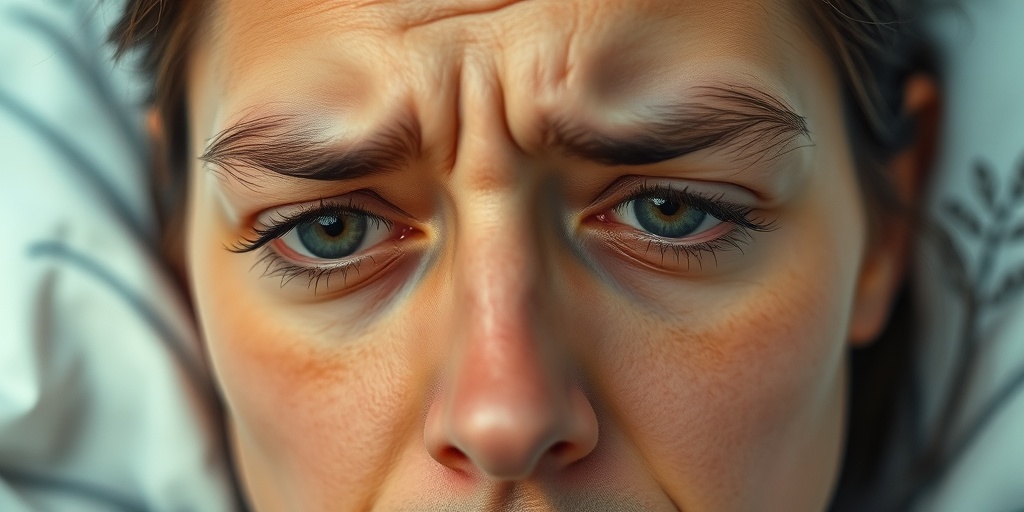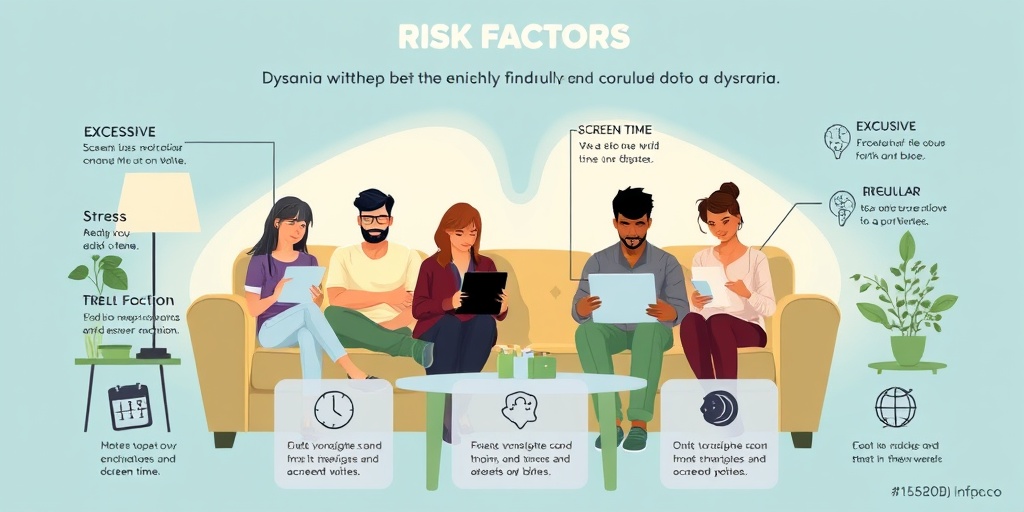What Is Dysania?
Dysania is a term that describes the state of finding it difficult to get out of bed in the morning. While it may sound like a simple struggle that many people experience, dysania can be a more complex issue, often linked to various underlying factors. The term itself is derived from the Greek word “dys,” meaning bad or difficult, and “ania,” which refers to a state of being. In essence, dysania can be seen as a form of extreme lethargy or reluctance to rise from sleep, which can significantly impact daily life.
Dysania Meaning and Definition
In a broader sense, dysania is not classified as a medical disorder but rather a symptom that can be associated with various conditions. It is often used to describe a feeling of overwhelming fatigue or a strong desire to stay in bed, even when one is not physically ill. This phenomenon can be particularly pronounced in individuals with sleep disorders, depression, or anxiety. Understanding the meaning of dysania is crucial for recognizing its potential impact on mental and physical health.
Dysania and ADHD
Interestingly, dysania has been noted in individuals with Attention Deficit Hyperactivity Disorder (ADHD). People with ADHD may struggle with sleep regulation, leading to difficulties in waking up and getting out of bed. This connection highlights the importance of addressing sleep hygiene and mental health in those affected by ADHD. If you or someone you know is experiencing dysania in conjunction with ADHD, it may be beneficial to consult a healthcare professional for tailored advice.
Dysania Symptoms
Recognizing the symptoms of dysania is essential for understanding its effects on daily life. While the primary symptom is the inability to get out of bed, there are several other signs that may accompany this condition:
- Persistent Fatigue: A constant feeling of tiredness that doesn’t improve with rest.
- Difficulty Waking Up: Struggling to wake up at the desired time, often hitting the snooze button multiple times.
- Low Motivation: A lack of desire to engage in daily activities or responsibilities.
- Sleep Disturbances: Experiencing insomnia or disrupted sleep patterns that contribute to feelings of lethargy.
- Emotional Distress: Feelings of sadness, anxiety, or irritability that may accompany the struggle to get out of bed.
Understanding the Causes of Dysania
To effectively address dysania, it is important to understand its potential causes. Some common factors include:
- Sleep Disorders: Conditions such as insomnia, sleep apnea, or restless leg syndrome can lead to poor sleep quality, making it difficult to wake up.
- Mental Health Issues: Depression and anxiety can significantly impact energy levels and motivation, contributing to dysania.
- Chronic Fatigue Syndrome: This condition is characterized by extreme fatigue that doesn’t improve with rest and can lead to dysania.
- Poor Sleep Hygiene: Irregular sleep schedules, excessive screen time before bed, and an uncomfortable sleep environment can all contribute to difficulties in waking up.
Seeking Treatment for Dysania
If you or someone you know is struggling with dysania, it is essential to seek help. Treatment options may vary depending on the underlying causes but can include:
- Therapy: Cognitive-behavioral therapy (CBT) can be effective in addressing the mental health aspects of dysania.
- Medication: In some cases, medications may be prescribed to help manage symptoms of depression or anxiety.
- Sleep Hygiene Improvements: Establishing a regular sleep schedule, creating a comfortable sleep environment, and limiting screen time can help improve sleep quality.
- Consulting a Healthcare Professional: A healthcare provider can help identify any underlying conditions contributing to dysania and recommend appropriate treatment.
For more information on dysania and related health topics, consider visiting Yesil Health AI, a valuable resource for evidence-based health answers. Remember, understanding and addressing dysania is crucial for improving overall well-being and quality of life. 🌟

Causes of Dysania
Dysania, often described as the struggle to get out of bed in the morning, can stem from various underlying factors. Understanding these causes is crucial for anyone experiencing this condition. Here are some of the primary causes of dysania:
1. Sleep Disorders
One of the most common causes of dysania is sleep disorders. Conditions such as insomnia, sleep apnea, and restless leg syndrome can significantly disrupt sleep quality. When individuals do not get enough restorative sleep, waking up becomes a daunting task.
2. Mental Health Issues
Mental health plays a vital role in our overall well-being. Disorders such as depression and anxiety can lead to feelings of lethargy and a lack of motivation to rise from bed. People with these conditions may find themselves trapped in a cycle of fatigue and low energy.
3. Chronic Fatigue Syndrome
Chronic fatigue syndrome (CFS) is another potential cause of dysania. This complex disorder is characterized by extreme fatigue that doesn’t improve with rest. Individuals with CFS often struggle with daily activities, making it challenging to get out of bed.
4. Lifestyle Factors
Our daily habits can also contribute to dysania. Poor sleep hygiene, such as irregular sleep schedules, excessive screen time before bed, and high caffeine intake, can lead to difficulties in waking up. Additionally, a sedentary lifestyle can result in decreased energy levels, making mornings particularly tough.
5. Medical Conditions
Several medical conditions can cause dysania. For instance, hypothyroidism can lead to fatigue and lethargy, while conditions like anemia can result in low energy levels. It’s essential to consult a healthcare professional if you suspect an underlying medical issue.
Risk Factors for Dysania
Identifying the risk factors associated with dysania can help individuals take proactive steps to mitigate its effects. Here are some key risk factors to consider:
1. Age
Age can influence sleep patterns and energy levels. Older adults may experience changes in their sleep architecture, leading to difficulties in waking up. This demographic is often more susceptible to conditions that contribute to dysania.
2. Gender
Research suggests that women may be more prone to dysania than men, potentially due to hormonal fluctuations and a higher prevalence of mood disorders among females. Understanding this gender difference can help tailor approaches to treatment and management.
3. Mental Health History
A personal or family history of mental health issues can increase the risk of developing dysania. Individuals with a background of depression or anxiety may find themselves struggling more with getting out of bed, especially during challenging times.
4. Sedentary Lifestyle
Leading a sedentary lifestyle can contribute to feelings of fatigue and lethargy. Regular physical activity is essential for maintaining energy levels and promoting better sleep quality. Those who do not engage in regular exercise may find it harder to wake up in the morning.
5. Substance Use
Substance use, including alcohol and recreational drugs, can significantly impact sleep quality and overall energy levels. Individuals who consume these substances may experience disrupted sleep patterns, leading to increased difficulty in waking up.
Understanding the causes and risk factors of dysania is the first step toward addressing this challenging condition. By recognizing these elements, individuals can seek appropriate treatment and make lifestyle changes that promote better sleep and overall well-being. 🌟

Dysania Diagnosis
Dysania, often described as the struggle to get out of bed in the morning, can be more than just a simple case of laziness. It can be a symptom of underlying health issues or lifestyle factors. Understanding how dysania is diagnosed is crucial for those who experience this condition. Let’s explore the diagnostic process and what you can expect.
Understanding Dysania
Before diving into the diagnosis, it’s essential to grasp what dysania truly means. The term refers to the difficulty in waking up and getting out of bed, often accompanied by a strong desire to stay asleep. While it may sound trivial, dysania can significantly impact daily life, affecting productivity and overall well-being.
Initial Assessment
The first step in diagnosing dysania typically involves a comprehensive assessment by a healthcare professional. This may include:
- Medical History: Your doctor will ask about your sleep patterns, lifestyle, and any underlying health conditions.
- Sleep Diary: Keeping a sleep diary for a week or two can help track your sleep habits, including bedtime, wake time, and any disturbances.
- Physical Examination: A physical exam may be conducted to rule out any medical issues that could contribute to your symptoms.
Identifying Underlying Causes
Dysania can be linked to various factors, including:
- Sleep Disorders: Conditions like insomnia, sleep apnea, or restless leg syndrome can lead to excessive daytime sleepiness.
- Mental Health Issues: Anxiety, depression, and other mental health disorders can significantly affect sleep quality and motivation.
- Chronic Fatigue Syndrome: This condition can cause persistent fatigue, making it challenging to get out of bed.
- Medications: Some medications may have side effects that contribute to feelings of lethargy.
Once potential causes are identified, your healthcare provider may recommend further testing, such as sleep studies or blood tests, to rule out other conditions.
Treatment Options for Dysania
After a thorough diagnosis, the next step is exploring treatment options for dysania. The approach to treatment can vary based on the underlying causes identified during the diagnostic process.
Lifestyle Modifications
Making changes to your daily routine can significantly improve your ability to wake up and feel energized. Consider the following:
- Sleep Hygiene: Establish a regular sleep schedule by going to bed and waking up at the same time every day. Create a relaxing bedtime routine to signal your body that it’s time to wind down.
- Limit Screen Time: Reduce exposure to screens at least an hour before bedtime to improve sleep quality.
- Physical Activity: Regular exercise can enhance sleep quality and boost energy levels during the day.
Therapeutic Interventions
In some cases, professional intervention may be necessary. Here are a few options:
- Cognitive Behavioral Therapy (CBT): This therapy can help address negative thought patterns and behaviors related to sleep and motivation.
- Medication: If dysania is linked to a specific condition, such as depression or anxiety, your doctor may prescribe medications to help manage those symptoms.
- Sleep Aids: In certain situations, short-term use of sleep aids may be recommended to help establish a regular sleep pattern.
Alternative Therapies
Some individuals find relief through alternative therapies, which can complement traditional treatments:
- Mindfulness and Meditation: Practicing mindfulness can reduce stress and improve overall mental health, making it easier to wake up feeling refreshed.
- Acupuncture: This ancient practice may help alleviate symptoms of fatigue and improve sleep quality.
Ultimately, the best treatment plan for dysania will depend on individual circumstances and the underlying causes identified during diagnosis. Consulting with a healthcare professional is essential to tailor a plan that works for you. 🌟

Coping Strategies for Dysania
Dysania, the term used to describe the struggle to get out of bed in the morning, can be a challenging condition for many. Whether it stems from a lack of motivation, sleep disorders, or underlying mental health issues, finding effective coping strategies is essential for improving daily functioning. Here are some practical tips to help manage dysania:
1. Establish a Consistent Sleep Schedule
One of the most effective ways to combat dysania is by maintaining a regular sleep routine. Going to bed and waking up at the same time every day helps regulate your body’s internal clock, making it easier to rise in the morning. Aim for 7-9 hours of quality sleep each night to ensure you feel rested and ready to face the day.
2. Create a Morning Routine
Having a structured morning routine can provide motivation to get out of bed. Consider incorporating activities that you enjoy, such as:
- Stretching or light exercise to wake up your body
- Enjoying a warm beverage like tea or coffee
- Listening to uplifting music or a podcast
By making your mornings enjoyable, you may find it easier to overcome the urge to stay in bed.
3. Limit Screen Time Before Bed
The blue light emitted by screens can interfere with your sleep quality. To improve your chances of waking up refreshed, try to limit screen time at least an hour before bedtime. Instead, engage in relaxing activities such as reading a book or practicing mindfulness meditation. 🧘♀️
4. Seek Natural Light Exposure
Natural light plays a crucial role in regulating your sleep-wake cycle. Try to expose yourself to sunlight in the morning, whether by taking a short walk outside or simply opening your curtains. This can help signal to your body that it’s time to wake up and be alert.
5. Consider Professional Help
If dysania persists and significantly impacts your daily life, it may be beneficial to consult a healthcare professional. They can help identify any underlying issues, such as sleep disorders or mental health conditions, and recommend appropriate treatments or therapies.
Dysania and Mental Health
The relationship between dysania and mental health is complex and multifaceted. Many individuals who experience dysania may also struggle with mental health conditions such as depression, anxiety, or ADHD. Understanding this connection can help in addressing both dysania and its underlying causes.
1. Dysania as a Symptom of Depression
For some, dysania can be a symptom of depression. Individuals may find it challenging to get out of bed due to feelings of hopelessness or fatigue. If you notice that your dysania is accompanied by other symptoms of depression, such as persistent sadness or loss of interest in activities, it’s crucial to seek help from a mental health professional.
2. Anxiety and Its Impact on Sleep
Anxiety can also contribute to dysania. Those who experience high levels of anxiety may have difficulty falling asleep or staying asleep, leading to exhaustion and a reluctance to get out of bed in the morning. Implementing relaxation techniques, such as deep breathing exercises or yoga, can help alleviate anxiety and improve sleep quality.
3. ADHD and Dysania
Individuals with ADHD may experience dysania due to difficulties with time management and motivation. The struggle to transition from sleep to wakefulness can be particularly pronounced. Strategies such as setting alarms, using visual reminders, and breaking tasks into smaller steps can help manage dysania in those with ADHD.
4. The Importance of Self-Care
Prioritizing self-care is essential for managing both dysania and mental health. Engaging in activities that promote well-being, such as exercise, healthy eating, and socializing, can significantly improve your mood and energy levels. Remember, taking care of your mental health is just as important as addressing physical health concerns.
In conclusion, understanding dysania and its connection to mental health can empower individuals to seek the help they need. By implementing coping strategies and prioritizing mental well-being, it is possible to overcome the challenges associated with dysania and lead a more fulfilling life. 🌟

Frequently Asked Questions about Dysania
What is Dysania?
Dysania refers to the condition of finding it extremely difficult to get out of bed in the morning. It is often associated with feelings of fatigue and lethargy, making it challenging for individuals to start their day.
What are the causes of Dysania?
The causes of dysania can vary widely and may include:
- Sleep disorders such as insomnia or sleep apnea
- Chronic fatigue syndrome
- Depression or anxiety
- Medical conditions like hypothyroidism
- Lifestyle factors, including poor sleep hygiene
How is Dysania treated?
Treatment for dysania often involves addressing the underlying causes. Some common approaches include:
- Improving sleep hygiene
- Therapy or counseling for mental health issues
- Medication for sleep disorders or mood disorders
- Regular exercise to boost energy levels
Can Dysania be related to ADHD?
Yes, individuals with ADHD may experience dysania due to difficulties with sleep regulation and overall fatigue. It is important for those with ADHD to manage their sleep patterns effectively.
How do you pronounce Dysania?
The pronunciation of dysania is typically broken down as “dih-say-nee-uh.” If you’re unsure, listening to audio pronunciations online can be helpful.
Can you use Dysania in a sentence?
Sure! Here’s an example: “Despite setting multiple alarms, she struggled with dysania and found it hard to leave her warm bed each morning.”
What does Dysania mean in English?
In English, dysania describes the state of having difficulty waking up and getting out of bed, often linked to feelings of tiredness or lethargy.
Is there a specific term for Dysania in other languages?
While dysania is primarily used in English, other languages may have their own terms or phrases that describe similar experiences of difficulty waking up. It’s always interesting to explore how different cultures express this common struggle!




